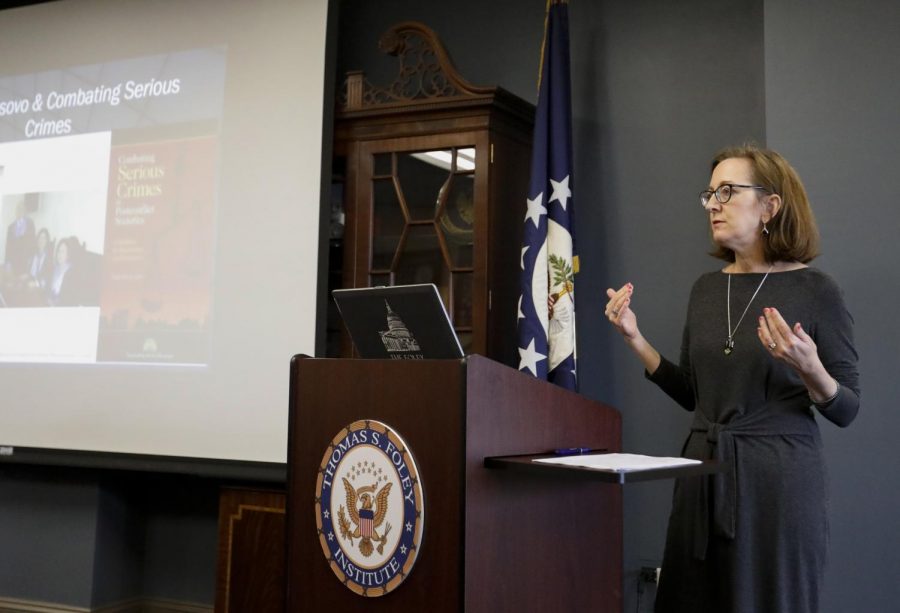Int’l peacekeeper discusses reforming war-torn regions
Rausch worked to establish justice systems, reduce crime overseas
EZEKIEL NELSON | THE DAILY EVERGREEN
WSU’s Foley Institute hosts associate vice president of Global Practice and Innovation at the US Institute of Peace, Colette Rausch to talk about rule of law and conflict around the word Tuesday afternoon in Bryan Hall.
April 11, 2018
An international peace advocate shared her experiences with war, its aftermath and people affected by armed conflicts Tuesday at a Foley Institute talk.
Colette Rausch, associate vice president of global practice and innovation at the United States Institute of Peace, a federally funded Washington D.C.-based organization that studies global conflicts, said the U.S. is lucky to have a developed justice system.
“You’re very blessed with what you have here,” Rausch said. “You take it for granted.”
Rausch got her start as an attorney, and became involved with the Organization for Security and Cooperation in Europe in 2001. Her assignment with OSCE, an intergovernmental security organization, took her to Kosovo, where she helped establish a new and reformed justice system.
Speaking on her work in other countries, Rausch said she was tasked with trying to make sure no one escaped the rule of law, but encountered many challenges. This was especially true in Kosovo, which was recovering from a war that had ended two years prior to her arrival.
“A war does not completely end,” Rausch said. “There is no end to hostility and violence.”
She began working for USIP after returning from Kosovo, where to tackled “serious crimes.” She described these as crimes that threaten to tear the fabric of a country apart, when there are only a few delicate threads of peace holding it together.
Having gone on many missions throughout the world, Rausch talked about the power vacuum she observed after major victories. When a party in power has been successfully deposed, there is a “golden hour” when everyone celebrates their victory and fails to notice someone else taking power.
Rausch recalled one incident in Nepal where this was handled peacefully. Police and humanitarians, who normally opposed each other, worked together to counter corruption and abuse of power.
“They started engaging in dialogue instead of conflict.” Rausch said.
She said she has seen other instances of adversity overcome. She played a video of her interviewing Salwa Al-Tajoury, a Libyan woman who thought of a unique way to reclaim her power after years of warfare. Al-Tajoury repurposed a military jeep to appear more friendly with a pink, floral paint job.
“It’s a very important message to the wounded, the people who lost their legs or an arm,” Al-Tajoury said in the video. “Even if you are broken, your life is not over.”
Along with Al-Tajoury’s jeep, Rausch also described a museum full of art that was made from old bomb fragments and repurposed weapons.
“At the end of the day,” she said, “If something is going to evolve, it has to evolve internally.”





















